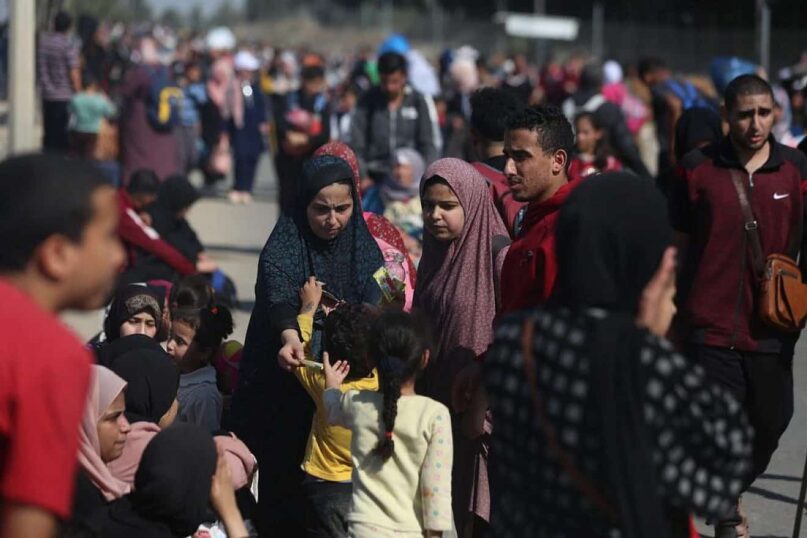
By Alan Stein
There’s a question I’ve been pondering since Sky News reporter Kay Burley, referring to the impending hostage deal calling for Israel to release 150 terrorists in exchange for 50 of the innocent Israelis kidnapped by Hamas on Oct. 7, asked a visibly stunned Eylon Levy “Does Israel not think that Palestinian lives are valued as highly as Israeli lives.”
It was clearly a trap, meant to elicit an answer that would be used to call Levy a bigot for valuing Palestinian lives less than Israeli lives. He avoided her trap, but in truth everyone values some lives more than others.
Like most Americans, I value American lives more than lives of people in other countries. Most of us pay more attention to a murder in London than one in N’Djamena. A shooting in Waterbury is far more likely to be on the front page of the Republican-American than one in London or even Hartford.
The way that question was posed to Eylon Levy is an example of the double standard routinely applied to Israel. Has anyone heard a similar question ever being asked of a representative of any other country?
It would be abnormal for Israelis to not value the lives of their brethren more than those of others, particularly others dedicated to Israel’s destruction.
What’s abnormal is how their own demands for that lopsided exchange indicate Palestinians themselves value Israeli lives more than their own.
Rabbi Shmuel Reichman reports hearing a Hamas leader saying “Hamas values death, while Israel value life; that is their greatest weakness.”
CNN’s Sam Kiley reported that Sheikh Ahmed Yassin, the founder of Hamas, told him “Israelis love life” while “we celebrate the greatest gift of martyrdom for our children. Every mother wants that for her child.”
In 2011, Israel released 1,027 terrorists to free a single Israeli, Gilad Shalit.
Israelis rejoiced in the release of Shalit, but many opposed the deal, correctly believing it would lead to more fatal terror attacks. One of the terrorists released in that deal, Yahya Sinwar, was the mastermind of the Oct. 7 massacre.
While he was in custody, Israeli doctors had saved Sinwar’s life, curing him of an aggressive strain of brain cancer.
Israel saves the life of a Palestinian terrorist and he masterminds the slaughter of more than a thousand Israelis! Israel’s humanity often gets repaid with terror.
The support Israel had on Oct. 7 predictably started ebbing even before Israel began defending its people. The unavoidable casualties in Gaza now get massive attention while the mass murders of Israelis and the plight of the Israelis held hostage are virtually ignored. That the proportion of civilian casualties in Gaza has been far below what the United Nations expects in modern warfare and what our American army considered acceptable in Iraq does nothing to protect Israel from constant criticism.
Mainstream American media rarely reports that Israeli forces find terrorists and weapons in every hospital, along with entrances to terror tunnels below, or that the IDF found weapons hidden behind MRI machines and RPGs in incubators for premature babies.
My wife and I had plane tickets leaving for Israel on Oct. 8. The Oct. 7 massacre changed our plans, but we finally arrived in Israel a few weeks ago.
Superficially, life for us in Netanya is almost normal, but no family in Israel has been unaffected. The hotels are filled with families displaced from their homes thanks to attacks by Hamas and Hezbollah terrorists in Gaza, Lebanon and Syria. Almost everyone is worried about close friends and relatives fighting in Gaza. Almost everyone knows someone who was murdered in the Oct. 7 massacre, after being taken hostage or killed while serving in Gaza.
Nobody wants the war to end more than Israelis, but they also understand it must be ended in a way that ensures Hamas will not be able to carry out its pledge to repeat its Oct. 7 atrocities “again and again.” They know each previous war ended with a ceasefire during which Hamas took aid meant to help civilians, used it to enrich its leaders, build its elaborate terror tunnel system and strengthen itself, then broke the ceasefire with more terror, war, death and destruction.
Israelis recognize they have no alternative to what they are doing. They will not be able to live in peace unless they win this war.
In contrast, the terrorists in Gaza and the Palestinian Authority controlled portions of Judea and Samaria do have a choice. They can continue the path of terror and mass murder of Israelis and catastrophe for Gazans. Or they can choose the path of peace, raising their children to grow up and live normal lives rather than die as shahids.
While the Israeli Defense Force is doing what it must, in Netanya we see people trying to live their lives as normally as possible. Every time they enjoy a walk, or sit in a cafe, or visit friends, or play tennis – I’ve done that a few times since getting to Israel – they deprive the terrorists of a victory and make a small contribution to the victory of good over evil.
Hamas thinks the Israeli love of life is Israel’s weakness, and in a sense they’re right, but it’s also Israel’s great strength.
Alan Stein, Ph.D., was formerly a long time resident of Waterbury. Today, he and his wife Marsha split their time between Netanya in Israel and Natick, MA. He is president emeritus of PRIMERConnecticut (Promoting Responsibility in Middle East Reporting) and the founder of PRIMER-Massachusetts and PRIMER-Israel.









 Southern New England Jewish Ledger
Southern New England Jewish Ledger












